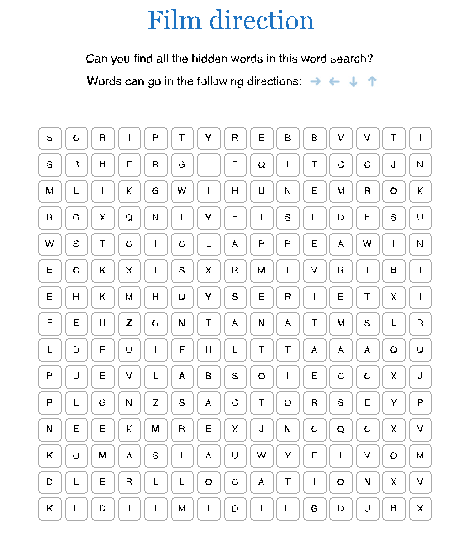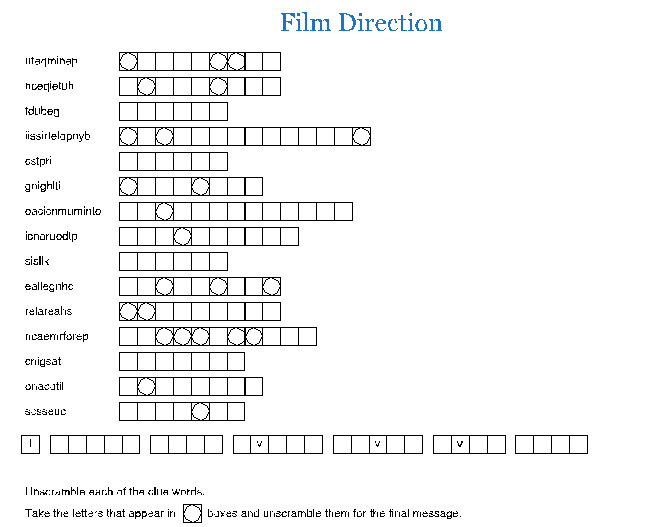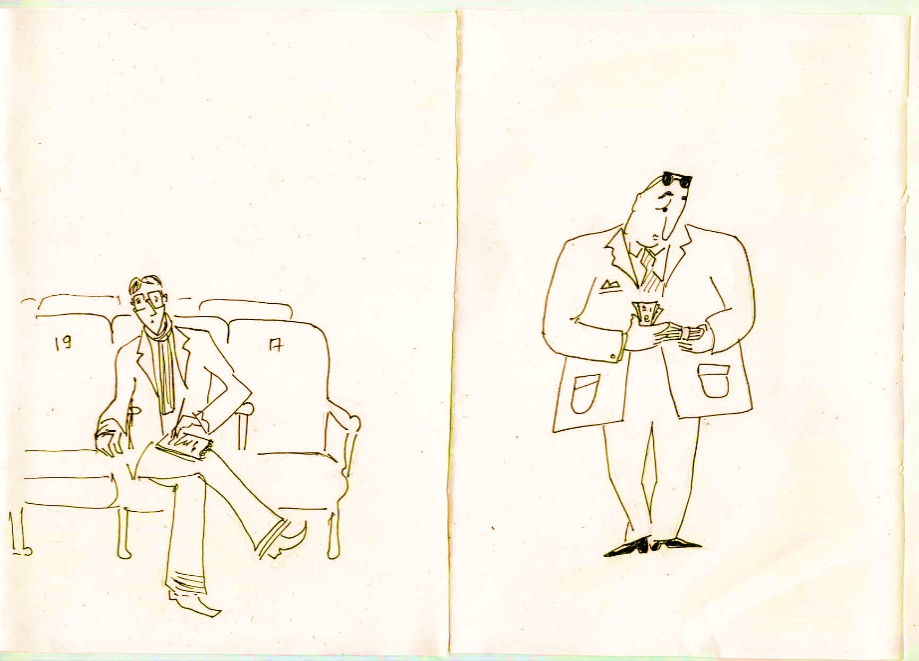ВУЗ: Не указан
Категория: Не указан
Дисциплина: Не указана
Добавлен: 06.09.2024
Просмотров: 132
Скачиваний: 0
During post-production, the film director works closely with editors to reach the final cut of the film.
At all stages, film directors need to inspire and motivate the team to produce the best possible results. That’s why the director should be able to act as a strong and confident leader. On the one hand, he must constantly make decisions. On the other hand, he must be able to delegate, and to collaborate with others. Excellent communication skills are very important.
It goes without saying that the film director needs to understand the entire filmmaking process, its technical and creative aspects. He must be able to work long hours. He must be able to remain calm and think clearly under great pressure.
There are numerous training courses and reference books on directing, but formal qualifications are not necessary to become a film director. It’s really important to get practical experience. If you watch successful film directors at work, it can do you a lot of good as well.
Exercise 43. Choose the most suitable heading for each paragraph from the list of headings.
Qualifications and experience
Responsibilities
Popular film directors
General description
Skills
History of film directing
Exercise 44. Do the following statements agree with the information given in the text?
(YES / NO / NOT GIVEN)
The film director…
…connects all the people who are involved in the film production.
…does not make any decision regarding the structure of the film.
…always fulfills only one function.
…helps draw storyboards.
…never writes any scripts.
…performs the selection of actors who will play in the film.
…does not participate in pre-production.
…holds practice sessions with actors.
…should know every aspect of camera work, sound, lighting and special effects.
…never handles financial matters.
…should have a special vision and a set of skills.
…does not need leadership skills.
…can make a film on his own.
…should be able to entertain the film crew.
…should necessarily go to a film school before shooting his first film.
…should watch a number of classical movies in order to be proficient.
…should always start as a scriptwriter.
…may find it useful to watch another film director at work.
… overcomes a number of obstacles in his career.
Exercise 45. Which paragraph contains the following statements?
The film director…
…has an option of attending an educational course or reading literature before making films.
…can acquire filmmaking skills by doing some practical job.
…should be confident about what he does.
…makes his crew want to achieve the film they have conceived together.
…is held accountable for the popularity of the film.
…should be able not to lose his temper.
…should have a very strong liking of what he does.
…should be hard-working.
…may be involved into creating a drama.
…provides an interconnection among all the filming crews.
Vocabulary and communication
Exercise 46. Match the words in the columns to form phrases.
to direct a. skills
filmmaking b. plays
film c. responsible for
creative d. rehearsals
to hunt for e. films
amateur f. production
entry-level g. locations
to direct h. positions
to be i. techniques
Exercise 47. Solve the puzzle.

Exercise 48. Cross odd one out.
1) film play movie flick
2) script play story shot
3) terrible remarkable excellent wonderful
4) confident lazy calm creative
5) cast crew team unit
6) to shoot to make to stage to film
7) a frame a shot a still a clip
8) to motivate to avoid to inspire to create
9) sound screening lighting special effects
Exercise 49. Choose the best option and translate the sentences.
The film director / scriptwriter works with the movie producer to cast the actors.
To become a movie director one needs creative / analytical skills.
Lighting / Casting includes the use of both artificial light sources and natural illumination.
The director does not know how to operate the equipment / technique.
Film directors are responsible / late for the creative side of the film.
John does not want to recycle / rewrite the script. He likes the draft version so much that he does not want to make any changes.
Martin works with actors / scriptwriters very well – every performer always knows what to do.
His creative / technical skills are remarkable and he can make up an interesting story in 5 minutes, but he is not a team leader and that is why he does not want to direct films.
Glenn does not have any formal qualifications / requirements, but he is shooting a film.
The director can’t find a suitable location / actor to shoot a sunset scene.
Exercise 50. Translate into English.
Само собой разумеется, что режиссёру необходимо быть творческим человеком, чтобы снимать успешные картины.
Во время подготовительного периода режиссёр принимает много важных решений.
Ты хочешь сказать, что он всё ещё разрабатывает режиссёрский сценарий? – Да, он сейчас делает именно это.
Это правда, что вы сейчас делаете раскадровку? – Уже нет. Наш фильм уже в производстве.
Этот режиссёр не интересуется техническими аспектами кинопроизводства. Он думает, что за него всё должны делать другие.
Я думаю, всем нужно знать, как работать со светом, звуком, камерой и монтажным оборудованием.
У этого оператора почти никогда не бывает проблем с операторской группой: он настоящий лидер.
Нашему продюсеру не нравится окончательный вариант монтажа нашего фильма.
Этот режиссёр любит снимать крупные планы. Он считает, что чем больше крупных планов, тем лучше.
Режиссёру нужно быть уверенным в собственных силах, чтобы вдохновлять и мотивировать других членов съёмочной группы.
В чём заключаются основные обязанности рабочего-постановщика?
Любой кинематографист должен уметь работать в стрессовых условиях.
Exercise 51. Role-play a dialogue.
Student A. You are an experienced film director who is ready to give advice on becoming a filmmaker.
Student B. You are about to apply to a film school and you are lucky to have a chance to speak to an experienced film director. Ask a number of questions.
Suggested ideas: ask about responsibilities, necessary knowledge, working with the cast and crew, formal training, skills, equipment.
Exercise 52. Solve the puzzle and discuss the quotation.

This is a quote by Quentin Tarantino. What philosophical question does it raise? What’s the difference between stealing and borrowing in art? Discuss the questions with your partner.
Exercise 53. Role-play a dialogue.
Student A: You are a film school student. Think of the classes you are taking and whether you like them or not. What are you studying more: equipment or principles of filmmaking? Do you have any film screenings? Do you study film history? Do you have any master-classes?
Student B: You are thinking of applying to a film school and becoming a film director. Ask you partner whether he likes his film school or not, what classes he is taking, if the classes are focused on working with the equipment or theoretical principles, and whether any famous film-directors come to lecture in his film school.
At the end, Student B should make a decision about entering the film school.
Reading
Exercise 54. Read the article on movie producers’ job and make sure you know all the highlighted words.
Responsibilities of a Movie Producer
A
movie producer is the person responsible for making high-quality
movie on time and within budget. That means he supervises and
packages the project from conception to distribution to theaters; he
communicates with the studio and manages the work of hundreds of
individuals. 
As you can see, movie producers do indeed have to wear many hats during movie production. Here are some of the main producer’s responsibilities:
Pre-production
To find material from a book or script.
To get the script into good enough shape to attract a director (and
studio, if this is not a studio-initiated production).
To secure financing for the film, if it is not being made for a studio.
To choose the director and other members of the creative team.
To cast the actors, working with the director.
To determine locations and budget.
To decide on cinematographer and special effects.
To hire a production team including crew and producers.
To draw up a shooting schedule.
To create a detailed plan of action for production.
Production
To offer creative suggestions to the director.
To handle problems with actors or creative staff.
To monitor production timetable and budget.
To review video dailies, the film shot each day.
Post-production
To discuss order and selection of scenes with the director.
To review the final cut of the film after it is edited.
In some cases, to polish, revise and restructure the film to create the final cut.
To work with a distributor to secure distribution for the film. This may include showing the distributors the final cut of the film.
To review the distributor’s advertising campaign for the film.
Types of Movie Producers
If you watch all the credits roll at the end of a movie, you know that a lot of different people take part in producing and distributing the movie. If you read closely, you may notice that the credits name movie producers of several different types.
Movie production is such a complicated process that usually one producer, known as the executive producer, needs help from others who take on part of the producer responsibilities. We’ve already discussed the role of the main producer. Here’s more about the specific jobs of producers, taken from the Producers Guild of America.
Executive Producer supervises one or more producers as they perform their duties for one or more films. The executive producer may represent the film studio and keep watch over the producer to make sure the movie is within budget. Or the title may be given as a symbolic gesture or to give a movie visibility. George Clooney, for example, is listed as executive producer for “Far from Heaven” (2002) to generate publicity, but didn’t spend any time on the set, according to the film’s producer Christine Vachon.
Associate Producer handles certain aspects of production. Usually the associate producer works through all three stages of the production, from preproduction to post-production. Sometimes the associate producer title is given to a key backer of the film who does not have a major role in producing the film.
Assistant Producer works on tasks assigned by the associate producer.
Co-Producer shares producer responsibilities as a team or group with other producers. One producer may take on creative responsibilities while another fulfils business functions. Or one of the producers may be a major investor who is not directly involved in the movie production. Or a co-producer may bring the script or the film’s star to the production.
Supervising Producer oversees one or more producers as they perform some or all of their duties. The supervising producer may take the place of an executive producer or work for the executive producer.
Coordinating Producer coordinates the work of several producers to create a final product. Coordinating producers are valuable when a studio produces several related films, as with “Spiderman”, or particularly when two related films are being produced at the same time, as with the two sequels to “The Pirates of the Caribbean”.
Line Producer handles the physical aspects of a movie’s production and usually doesn’t take part in creative decision-making. This is the person who oversees the budget and day-to-day activities during filming. He makes sure the movie stays on budget and handles any crises that may occur.
To become a movie producer, you’ll probably move up through some of these jobs. But expect stiff competition because jobs are limited at the major studios.
SUMMARY
The producer makes sure that a high-quality movie is produced on time and within budget. That means supervising the project from conception to distribution.
During pre-production the movie producer in the USA:
finds a script
raises money
chooses the director
casts the actors, working with the director
determines locations and budget
decides on the cinematographer and special effects
hires a production team
draws up a shooting schedule
During production the movie producer:
offers creative suggestions to the director
handles problems with actors or creative staff
monitors production timetable and budget
watches daily rushes
During post-production the producer:
discusses with the director which scenes to select
watches the final cut of the film
works with a distributor
There are several types of movie producers:
Executive Producer is the main producer. He supervises the other producers. The executive producer may represent a film studio. He makes sure the movie is within budget.
Associate Producer usually works through all the three stages of the production. He handles those aspects of production, which the executive producer asks him to handle.
Assistant Producer works on tasks that the associate producer gives him.
Co-Producer may have creative responsibilities or fulfill business functions. Or he may be a major investor who does not take direct part in the movie production.
Supervising Producer supervises the work of the other producers.
Coordinating Producer coordinates the work of several producers when a studio makes several related films.
Line Producer oversees the budget and day-to-day activities during filming. In addition, he handles any crises that may happen.
Exercise 55. True, False or Not Stated?
The producer takes part in all the production stages.
Nowadays the majority of producers have difficulties working for a studio.
The producer is responsible for making a high-quality film.
The producer never looks for any scripts.
For his film the producer chooses only the director.
The producer does not work out the shooting schedule.
The producer does not solve any problems with the creative personnel.
The producer never takes part in the editing.
Exercise 56. According to the article, which of the producers does the following:
controls the work of other producers?
may not perform essential functions in the film production?
may generate the idea of what story should be filmed?
does not have a real say in the process of film production?
ensures that the whole work is coordinated?